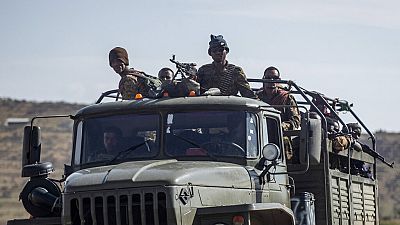Ethiopia
American citizens trapped in Tigray, a region at war for two years, are having the worst possible time reaching the United States, claiming they are victims of ethnic profiling and subjected to arbitrary detention and interrogation by Ethiopian authorities.
The Ethiopian government's demand that it be allowed to interrogate and detain all evacuated U.S. citizens on national security grounds led Washington to abandon plans to airlift its citizens to Tigray last year, according to emails from U.S. officials seen by AFP.
War broke out in November 2020 in this northern Ethiopian region, when Prime Minister Abiy Ahmed sent the army to remove regional authorities who challenged his authority and whom he accused of attacking military bases.
A caregiver living in Colorado, Zenebu Negesse was in Tigray at the time, visiting her mother. After a few months, she managed to leave the region by road, finding refuge with relatives in Addis Ababa, the Ethiopian capital.
But when she tried to board a flight to the United States, she was detained because, she says, of her origin.
She had been careful to hide any signs of her Tigrayan origin, including her facial scarring, for fear of being detained like some of her friends. But her name aroused suspicion.
After a gruelling interrogation in which she denied being Tigrayan, she was finally allowed to leave. "I was lucky. Others were not," she said, explaining that several passengers on her flight were detained.
A deacon of American nationality, Gebremedhn Gebrehiwot, also told of being questioned for an hour and a half at the Addis Ababa airport earlier this year when he was due to fly to the United States.
"All my papers were in order," he said. According to him, his "typically Tigrayan" name is the reason for his detention.
- Evacuation cancelled -
The authorities in Addis Ababa do not recognize dual citizenship and people of Ethiopian origin are sometimes treated as Ethiopians, regardless of their passports.
In November 2021, as the conflict spread and headed for the capital, the U.S. government had a plan in place to evacuate its nationals trapped in Tigray.
It finally gave up in the face of last-minute demands from the Ethiopian government, AFP has learned from several emails from American officials.
"The Ethiopian government ... withdrew the authorization on the day (of the evacuation, ed.) when the U.S. objected to the Ethiopian government's request that the passengers be screened and potentially detained indefinitely before being allowed to continue their journey," according to an email written by a Senate staffer.
In February, however, U.S. and Ethiopian authorities "cleared 217 U.S. citizens, legal permanent residents, visa applicants and guardians of minors from Mekele to Addis Ababa," a U.S. State Department spokesman told AFP.
He did not say whether any were then detained in Addis Ababa, nor how many of these people continued their journey to the United States.
The spokesman said no figures were available on the number of U.S. citizens in Tigray.
The Ethiopian government did not respond to requests from AFP.
- Bribe -
A 54-year-old Uber driver, Yohannes - who does not want to give his last name - thought he would never leave.
He says he was placed in solitary confinement at the Addis Ababa airport when he wanted to leave the country with his family in December 2020.
"I said I was a U.S. citizen, but they told me they wouldn't let me leave," he says.
He was finally able to board his flight after paying a large bribe to security officials, the price of saving his teenage son who suffers from diabetes.
A peace agreement was signed in early November between the government and the Tigrayan rebels. But even if access to Tigray were to open up, many Americans fear that their loved ones could be detained after leaving the region.












Go to video
Tanzania’s Prime Minister steps down ahead of elections
01:00
Pix of the Day: July 3, 2025
Go to video
’Black Empowerment’ law stalls Elon Musk's $113 million investment in SA
Go to video
In Kenya, 90% of packaged food needs health warning label under new rules
00:52
Nigeria’s Peter Obi to contest 2027 election, opposition coalition in jeopardy
Go to video
Cameroon’s Tourism Minister joins presidential race as Biya’s silence fuels uncertainty